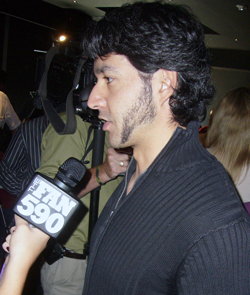Last Wednesday (2010.07.21), I attended a flesh-presser for the Paralympic, and I guess Olympic, team. It was intended to fan the flames of excitement for London 2012. (Photos.)
I found out about it only by chance and was pretty sure that, unaffiliated with CTV as I am, I’d be unwelcome, but I RSVPed with Marie-Hélène Cayer of the Canadian Paralympic Committee and showed up. The so-called Real Sports Bar, next to the Air Canada Centre in the exurban hinterlands of the waterfront, was the hangar-sized venue. I am quite sure this is the first and only time a dude in a power chair will have been displayed on the 50-foot “television” display they’ve got on their main wall, which spans both floors. (We were up on the mezzanine deck.)
After noticing the place had the second-nicest wheelchair washroom I’d ever seen, albeit without hand dryer or towels, I asked the greeter where Cayer was. He didn’t know. Or anyone from the Paralympics. That he didn’t know either. So I looked around and said the obvious: “I’ll just go over where the wheelchairs are and figure it out from there.” I introduced myself to everyone, adding that I was the only writer there who came solely for the Paralympics, a claim no one refuted.
I had, as ever, precisely no trouble chatting up these elite athletes – even afterward, when by sheer coincidence the only place to sit was on the couch with the two biggest guys in the place. (Swimmers. With the wingspan of a condor.) Elite athletes are possibly the only group I have never had a problem talking to. I find them refreshingly normal; they find me funny. But to be thought of as funny, pace DV8 Physical Theatre’s MSM, is the fate of any aging homosexualist, one greeted with resignation at best. It’s the role of a gay uncle reduced to easy quips at family gatherings. An air of bemusement is so facile as to amount to a defence mechanism.
Now, in recounting this tale I confront another structural obstacle related to age. I have been covering events like these (often exactly like these) for 15 years. Who wants another excruciating minute-by-minute recap? Frankly, nothing that interesting took place, and if you were on the Twitters, you read my disposable aperçus already.
 But I will in fact report something. I said I found out about the whole thing by chance; I meant by somebody retwitting a Twit from Brian McKeever, the ♡ ADORABLE ♡ superstar Paralympian. McKeever turned out to be the MC of the show, a welcome, even gutsy, decision from the Olympic braintrust, associated as it is with corruption and exclusion. (It is advisable to read Andrew Jennings’ books.) Yet this is the country whose Olympics was the first to operate Pride Houses on both the Vancouver and Whistler campuses, so maybe we aren’t ashamed of our minorities.
But I will in fact report something. I said I found out about the whole thing by chance; I meant by somebody retwitting a Twit from Brian McKeever, the ♡ ADORABLE ♡ superstar Paralympian. McKeever turned out to be the MC of the show, a welcome, even gutsy, decision from the Olympic braintrust, associated as it is with corruption and exclusion. (It is advisable to read Andrew Jennings’ books.) Yet this is the country whose Olympics was the first to operate Pride Houses on both the Vancouver and Whistler campuses, so maybe we aren’t ashamed of our minorities.
And if ever there were an athlete with a disability to get behind, it’s Brian McKeever – and his brother Robin, of course, since their class of blind skiing is a true team sport. (Brian McKeever didn’t win three medals at the Vancouver Paralympics; they both did, in the same way that driver and brakeman of the two-man bobsled get the medal.) He shatters the public perception of “disabled athlete” simply by failing to be in a wheelchair. Disabled sport contains multitudes. It’s a blessing and a curse, but something it isn’t is guys in chairs.
The McKeevers are dashing, charming, affable. In Brian’s case, I wonder if such is his core self or if he’s working really hard to be chipper all the time and will someday end up feeling like he’d been forced to paint on a happy face for all these years. This too amounts to a defence mechanism. Even if defensive, this charm offensive really works. The McKeevers are gold-plated assets to what the elite of this industry would call Paralympism. And they’re all ours. Work these boys for all they’ve got, I told Ms Cayer of the Paralympics.
I am not simply recounting conventional wisdom. I am not telling you what I saw on television. (We TiVoed the entirety of televised Paralympic coverage. There is only so much disabled skiing a man can watch.) Instead, I’m offering my firsthand experience. I got Brian McKeever’s attention, said hello, then complimented him on beating the odds by wearing ironic facial hair and getting away with it. “Well, with the blind guy, he might’ve missed a spot,” he affably quipped without missing a beat. I complimented him on having that line at the ready, then gave him a manly pat on the shoulder and left.
Ms Cayer sent me an effusive and heartfelt note two days later. I was amazed to receive this kind of attention. I shouldn’t be; the Paralympics deals with the value and scarcity of attention every day.